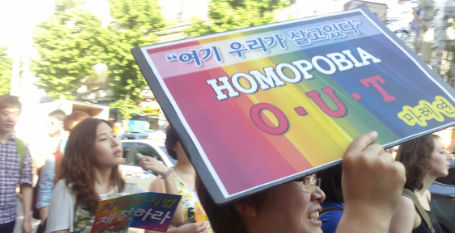The June 7 parade had been approved by a Seoul district office responsible for city streets but the district-office spokesman said May 29 that it has since revoked that permission.
The reason given was that city officials judged the parade inappropriate in the aftermath of the recent ferry tragedy.
Many in South Korea are still in mourning for the 205 people who died and 97 missing in the April 16 ferry accident on the country’s southwest coast. Most who perished were students.
Since then many celebrations, sports, government and promotional events have been canceled since the April 16 ferry sinking, which took around 300 lives, most of them students. The parade organizers said they are discussing whether to pay tribute to the victims at the event.
But blogs.wsj.com reports that organizers think the reason is more likely one of homophobia than for reasons of mourning.
A spokesman for the parade’s organizing committee told Korea Real Time that the authorities appear to have bowed to pressure from some Christian groups that oppose gay pride parade and equality rights for the LGBT community, a claim that the district-office spokesman denied.
Some Christian groups in recent years have stepped up their protests against same-sex relations. In 2012 groups protested against a Lady Gaga concert in Seoul, saying that the Western pop icon spread pro-gay propaganda through her songs.
The Korean Queer Festival begun in 2000, held in the South Korean capital of Seoul, has grown into one of the largest LGBTI pride events in Asia with organizers expecting 20,000 to take part this year.
The theme for this year’s festival is ‘Love Conquers Hate,’ and following the June 7 opening parade will be a week-long calendar of exhibitions, performances, parties and an LGBTI film festival.
Parade organizers say they will host the event as planned in the capital’s Sinchon area, a popular hangout for young people because of the several universities there.
Earlier, a spokesperson for the Korea Queer Festival encouraged not just LGBTIs to attend but also members of the general public who wanted to better understand their issues.
General awareness of homosexuality has remained low among the Korean public and Korean gays and lesbians still face difficulties, and many prefer not to reveal their gay identity to their family, friends or co-workers.

